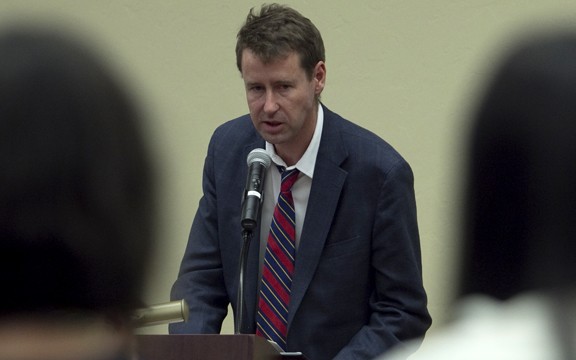An author accused Pima Community College of failing to prevent Jared Loughner from committing the Tucson shooting two years ago.
Pima Community College “has a lot to answer for” in regard to the Jan. 8, 2011, shooting that involved then-Rep. Gabrielle Giffords, said author Tom Zoellner at the UofA Bookstore on Wednesday.
The event, which was put on by the UA Confluence: Center for Creative Inquiry, focused on Zoellner’s book “A Safeway in Arizona: What the Gabrielle Giffords Shooting Tells Us About the Grand Canyon State and Life in America.”
Loughner, who pled guilty to 19 charges of murder and attempted murder from Jan. 8, 2011, is a former student of Pima Community College who was expelled due to his mental instability. Zoellner told attendees the college should have done more.
“If Pima Community College had thought to warn the courts or outside law enforcement agencies that Jared Loughner clearly met the legal test, this is in the Arizona law, of persistently or acutely disabled,” Zoellner said, reading from his book, “and if not an active threat to himself or others he probably would have to appear before a county judge and been unable to buy that firearm.”
Instead, the college sent Loughner a letter saying that he couldn’t return to school until he had been medically cleared.
“In my view that [expelling Loughner and not notifying the authorities] is sort of externalizing the problem to the community and a judge really ought to have been notified that, ‘Here is someone who is presenting threatening behavior,’” Zoellner said. “Arizona law, which actually is progressive in this area compared to other states, allowed them to do that, and in my view, why didn’t they?”
Zoellner is the author of five nonfiction books. A former reporter for The Arizona Republic, he also worked on the 2010 Giffords campaign and is currently an associate professor at Chapman University.
“We [Confluence: Center for Creative Inquiry] see this event as an opportunity to partner with the bookstore and bring renowned authors such as Mr. Zoellner to talk about the experience of writing a book that is linked very, very closely to our community,” said Javier Duran, director of the Confluence: Center for Creative Inquiry. “That documents the tragic events that happened in Tucson but also offers the perspective in terms of how a writer sees the community.”
The book was published on the one-year anniversary of the 2011 shootings and was written in 100 days, according to Zoellner.
“There are many issues that we can all think about, from gun control to how this whole incident brought the Tucson community closer together,” said Maria Aguayo Telles, program coordinator for the Confluence: Center for Creative Inquiry, “and that still tells us that there are so many things that we as a community still need to work on — without forgetting even Mr. Loughner had problems and issues that perhaps he could have been helped with, and sometimes with our busy schedules and lives we forget that others need our help.”








